| Who would think the
President of the United States doesn't want to upset New York City's
economy by bombing North Korea's nuclear production plant? Shhh...don't
tell anyone he doesn't want to make the Korean deli owners mad.
If he did, they might stop the flow of food to New Yorkers.
Read this not-so-parody on negotiating a peace in North Korea. |
 VigilanceVoice VigilanceVoice
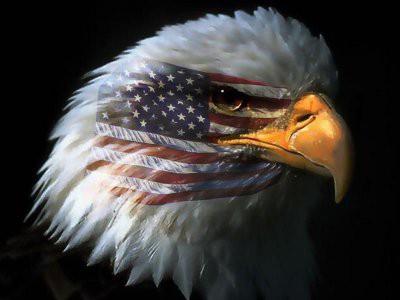
www.VigilanceVoice.com
Friday--January
3, 2003—Ground Zero Plus 478
___________________________________________________________
North Korea Terrorist Block
Hides In New York Delis
___________________________________________________________
by
Cliff McKenzie
Editor, New York City Combat Correspondent News
|
GROUND ZERO, New York City, Jan. 3-- I've
figured out why President Bush is dancing around the North Korean
nuclear production plant issue. I think I know why he's
reluctant to bomb North Korea's "bomb making" plant and eager to blast
Saddam Hussein out of existence.
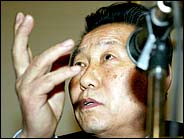
|
|
North Korea's top diplomat in Beijing, Choe
Jin Su, blamed the U.S. for his country's decision to re-start its
nuclear program. |
It has to do with New York City's delis.
The vast majority of delis in New York City as
well as in Los Angeles and other major U.S. cities, are run by
Koreans.
You blow up North Korea's nuclear plant, you
launch war in North Korea, you screw up South Korea. The whole
region suffers, including Japan and China.
If President Bush treats North Korea's
leader, Kim Jong Il, as he is Saddam Hussein, who's to say the deli
owners in New York City might not react. After all, a Korean is
a Korean, regardless of whether he or she is from the North or South.
It's still one country by ethnicity regardless of politics.
In New York City there are at least two delis
on every street.
Sometimes there are four, one on each
corner.
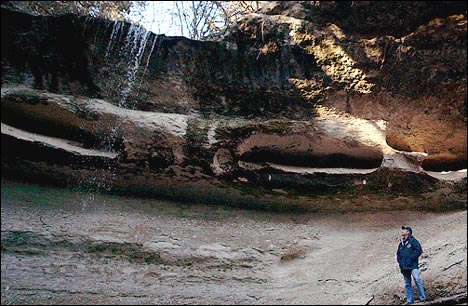
|
|
President Bush
showed off a waterfall from the recent rains at his Texas ranch
and talked to reporters about the nuclear standoff with North
Korea. He strongly criticized its leader Kim Jong Il.
|
While there are some other ethnic owners,
Koreans seem to dominate this field. I spent most of the evening
last night hunting for hard data to support my scenario that New York
Deli ownership is holding back President Bush from an all-out assault
on North Korea's Yongbyon nuclear facility which is reopening after
being closed down since 1994.
The problem goes back to 1994 when
North Korea allegedly violated a pact with the U.S. to forgo nuclear
arms in return for energy aid. Oil has been embargoed as a
club over North Korea to stop spending money on building military
might and divert funds to the economy. North Korea spends about
30 percent of its gross domestic product on the military.
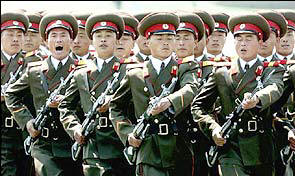 |
|
North Korean
Military |
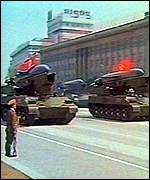 |
|
North Korean
missiles on parade |
Critics of Bush's policy
against Iraq are railing that the U.S. should expend the same
diplomatic energy on Iraq that is being used to deal with the North
Korean problem. That is, more negotiations should be
effected, more talks, more time and less saber rattling, less war
talk.
But I think the real
reason President Bush is hedging on North Korea is his fear of deli
retaliation here in New York City, as well as other major urban
centers where Koreans control the flow of food.
Big city people--the average
people not the rich ones--lean on deli's like more suburban
communities rely on convenience and grocery stores.
There aren't many grocery
stores in New York City. But there are billions of delis.
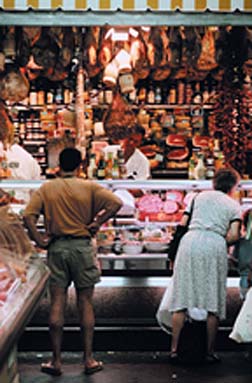
|
|
One of the
larger sized delis in NYC |
Total convenience stores in the
U.S. amount to over 130,000. On average, there is one
convenience store for every 2,333 people in America. In
New York City, applying that average suggests there are about 3,500
such stores dotted around the city.
But, since everything is
crammed into one place here, the averages can easily double.
It's more likely there are twice as many delis in New York City than
the average in the
U.S, one for every 1,150 people or so.
That would boost the number of deli's in the Big Apple to over 7,000.
Anyone who has ever walked the
streets of New York City would agree in a New York Minute that a
predominate source of commerce in the city is the deli. It
serves everything and everyone. Food, beer, drinks, groceries, pharmacy
items, toiletries, lotto and also makes sandwiches and provides meals.
Another good measure of the
number of delis is the New York cab system. I happen to know for
sure there are 11,000 cabs in New York City, and some 44,000 drivers.
If you were to liken
deli's to cabs, you'd be using your gut instincts properly.
Yellow Cabs and Delis are
hallmarks to New York City's landscape.
And, if you've ever been
in and out of New York Deli's, you know the majority of them are run
by Korean owners. If you're not sure, try arguing with one of
them about the prices, or implying you got the wrong amount of change
(less than you deserved, of course.)
So while I can't parade
"hard data" as I would prefer, I can wisely surmise that my suggestion
over 7,000 delis exist here is within reason if not actual fact.
Plus, lets add at least five employees per store. That's a
population of 35,000, getting pretty close to the Yellow Cab driver
data, another good benchmark for comparing deli density.
Also, if you make war with
North Korea, you automatically create war in South Korea.
North Korea has 11,000 missiles aimed at South Korea and Japan.
They aren't nuclear, but they are devastating little creatures that
can blow things up and level the earth.
North Korea could
retaliate against the 37,000 U.S. troops in South Korea and wipe out
lots of friends and relatives of the New York City deli owners.
That wouldn't be good. It wouldn't be good for New York
City, Chicago or Los Angeles, three major cities who have high Korean
deli ownership.
Economically, such
convenience stores represent a huge flow of cash in our society.
Store Watch, a business monitoring system for convenience stores
located at
http://www.storewatch.net/html/storewatch.html reports the average
store generates about $870,000 per year in sales. If you
multiply that times 7,000, you have a big chunk of change that flows
mostly through Korean hands in New York City--about $6 billion.
That's not small change.
If you think about it, the vast
amount of money spent by any consumer is for food.
Everyone is always going to the "store," but in New York City and
other big cities, people go to the "deli."
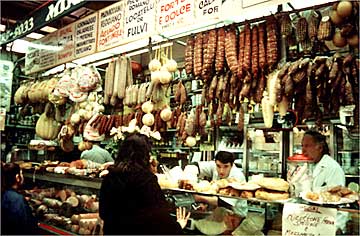
|
President Bush knows that if he attacks North Korea he is by default,
attacking New York City delis. He is risking turning the
flow of food to the mass populations of the big cities over to people
who will resent his war, and perhaps retaliate.
This isn't to suggest
that Korean deli merchants are Terrorists. But they are
mothers, fathers, grandparents, uncles, aunts, cousins, nephews and
nieces of those who will suffer. Blood spilled in Korea
can flow back to New York, Chicago and Los Angeles in a number of
ways.
What if all the delis
shut down in protest?
New Yorkers would starve!
Riots would take place.
September 11 would look
like a walk in the sun compared to the chaos that would happen.
Back when the Terrorists
attacked the World Trade Center, almost every Yellow Cab flew American
flags and many had signs in the cab's window saying "I support the
USA."
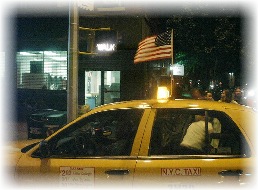 |
|
Vigilant Taxi
Driver |
The cab drivers knew the danger
of being earmarked a Middle Eastern sympathizer.
And, President Bush knows the
danger of rubbing the Korean merchants the wrong way. When
we attack Korea, we attack the deli system.
So, for those of
you wondering why the President is dancing around the North Korean
issue of nuclear weapons while rushing to judgment over Saddam
Hussein, the difference is Yellow Cabs versus delis.
New York could
survive easily if the cabs all came to a stop. If, for some
reason when we attack Iraq all the cab drivers protest, a shortage of
11,000 vehicles ferrying people here and there is not a great loss.
Subways and buses can pick up the slack.
But, if we attack
North Korea and the ripple effect spreads to South Korea, as it is
projected to do so, then great havoc could result. New
Yorkers could be starved to death.
Now, that's a big
issue.
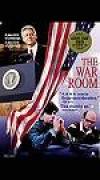 |
We often think that when the President of the United States enters the
War Room and the giant titanium doors slam shut, that the
conversations with his staff are about lofty issues of geopolitical consequence. We
don't want to think that the major global policies of the United
States are being formed around the threats of a deli strike, or that
the owners of a deli in New York City can influence the world.
But that his more
than likely.
The real facts of
life are simple. A roof over ones head, food, and water.
Things couldn't be simpler. Take away any one of those prime
elements to survival, and you have anarchy.
The Beast of Terror
would reign supreme if the delis in New York closed. He would
spew out Fear, Intimidation and Complacency...and dance in the streets
of chaos.
The President and his
advisors know that.
So, we can all look to a
quiet resolution to the North Korean problem. That
resolution will be simply to attack Iraq and squelch all the headlines
and questions about North Korea as we obliterate Hussein.
While that's going on,
perhaps secret negotiations can take place in North Korea about
issuing more Green Cards for more deli owners in the United States.
Peace can be as
simple as who sells the food.
If our tummies our
full, maybe we won't worry about who has the next nuclear bomb.
And maybe, just
maybe, President Bush will lift some embargos and flood North Korea
with New York delis. It might be cheaper to install 7,000 New
York Delis in North Korea than to bomb their nuclear site. I
think the North Koreans would rather have food in their tummies than
radioactive dust.
That would be the
most Vigilant decision, I think.
In the interim, I'm
going to be extra nice to my local deli owner. You can never
have enough friends in the food business.

|
| |
Jan 2--Where Is The Most Wanted Terrorist Waldo?
©2001
- 2004, VigilanceVoice.com, All rights reserved - a ((HYYPE))
design

|
|